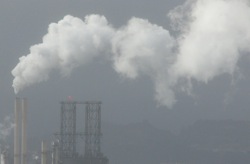
The dark underbelly of cap-and-trade was somewhat exposed in a four-hour hearing today before the Senate’s Select Committee on Climate Change and AB-32 Implementation. AB-32, of course, is shorthand for California’s Global Warming Solutions Act of 2006, which mandates a carbon trading program be in place by 2012.
Here’s my “highlights reel” from the panel of experts who testified, in order of appearance:
Mary Nichols, Chair, California Air Resources Board
– On carbon pricing: “There is no approach that does not involve administrative costs & headaches” but cap-and-trade “seems like a pretty good mix” of certainty provided by an enforced cap and market flexibility (versus an outright carbon tax of some sort).
– On California going “solo” with carbon trading (i.e. without the other states and provinces currently signed to the Western Carbon Initiative): The larger the territory, the more potential for “bad actors” but the greater the potential for meaningful savings & benefits to the economy.
Michael Wara, Stanford Law Professor
– On carbon offsets: “…difficult to administer;” to ensure real reductions, changes in behavior, has proven to be “a significant and ongoing challenge, in practice.”
– California appears to be “opting for prudent limits” on allowable offsets, at an anticipated 4%, versus more than 30% in the Waxman-Markey bill that has cleared the US House of Representatives.
– “Very few [offset] programs have been run without controversy.”
Ken Alex, California Attorney General’s Office
– On enforcement: “Every system has cheaters, especially where billions of dollars are involved.”
– Cap-and-trade provides “a permanent incentive for cheaters.” Unassailable data is essential for regulators.
– Regulators “must have sufficient authority” to assess meaningful penalties. Alex, who was involved in sorting out the state’s energy crisis of 2000-2001, recalled that “million-dollar penalties were irrelevant.”
Dallas Butraw, Economist, Resources for the Future
– Warned against a “phone book-sized” regulation.
– Cost of carbon emissions permits will be passed along to consumers but could be offset by tax breaks or a dividend system similar to what oil & gas companies pay to residents of Alaska.
David Harrison, Economist, NERA Economic Consulting
– On lessons from Europe: Despite a rocky start for the EU’s “pilot” program, the system for carbon trading in 27 countries has “evolved over time” to become “very successful.”
– The EU experience “really does show that cap & trade works. Emissions have been reduced.”
– There is “no silver bullet” for determining allocations; that in Europe has been a “messy” and “contentious” process.
– In spite of it all, the EU experience demonstrates that cap-and-trade is “not perfect but it really is better than the alternatives,” and provides a good laboratory for California.
The committee, chaired by Fran Pavley (D-L.A.), also heard from several business and environmental groups. At one point a speaker from the Natural Resources Defense Council (NRDC) argued briefly with a utility representative about whether electric rates are actually higher or lower in California, compared to the nation as a whole (apparent compromise: rates may be higher but average bills are lower).
Utilities complained that the system, as proposed, forces power companies to bear the brunt of the burden. Business interests warned that unbridled implementation of AB-32 “could add to an already alarming increase in job losses,” claimed that the state has no authority to hold carbon permit auctions under AB-32, and asked for initial permits to be given away to industry. Environmentalists asked for the opposite, urging that 100% of initial permits be auctioned off, i.e. that emitters be made to pay for them.
Numerous speakers expressed nervousness over validity of carbon offset programs. Regarding the various schemes for carbon storage in forests or soil, Assemblyman Jared Huffman (D-San Rafael) said “This one makes my head hurt.” There’ll be a lot of Excedrin passed around before this is through.
7 thoughts on “State Senators Hear Cap-and-Trade Caveats”
Comments are closed.

Why isn’t there anybody on that list looking out for my interests?
It’s all just people looking for which one is going to get a piece of the action.
The “action” being my wallet!
James, it might help the discussion to give some examples of people whom you would consider to represent your interests. And of course, there’s nothing to stop you from intervening directly in the process. Just working from memory, I think CARB has held more than 30 public hearings on AB-32.
Let’s have a look see on your blog roll.
Hmmm.
It seems to run the gamut of opinion, all the way from Joe Romm to Richard Littlemore. (Graig, imagine if you’re wrong.)
Oh there’s gristmill. Did you know that David Roberts called for “war crimes trials for these bastards — some sort of climate Nuremberg”?
I suppose he was refering to me.
No luck on the sidebar. I’ll have to get back to you.
I don’t see how this is answering my question.
“I’ll get back to you” means I’m not seeing much relief from the traditional watchdog, just a lot of journalists working hard to protect government from the people.
But you did report on the enemy’s movements, for that I thank you.
Craig. I have a question for you.
California is a big state. How many thermometers does HADCrut, GISS, ect. use to record the temperature of California in the Global Historical Climate Network (GHCN)?
Which is the greater number, State Senators vying to use the GHCN as a pretext to pick the public’s pocket, or the number of thermometers being used to phony up a global warming signal in California?
Good anology James,
are they using that one in the parking lot of the fire station
I love this quote – They all are going to have administrative costs.
You betcha, the more the meerier